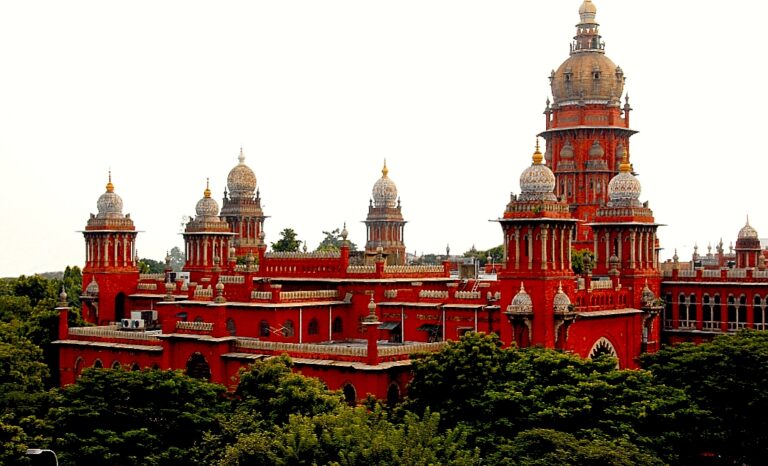In a landmark decision dated 18 October 2025, the Madras High Court reaffirmed that prosecution under the Income-tax Act cannot be initiated for mere delay in payment of tax unless the prosecution is supported by cogent evidence of wilful evasion or suppression of income. The ruling, delivered in G Square Layout Pvt Ltd & Ors. vs. Deputy Commissioner of Income-Tax, Central Circle-1(2), Chennai, has significant implications for both corporate and individual taxpayers who face delays in settling their tax dues.
Background of the Case
The petitioners, G Square Layout Pvt Ltd and related entities, were subjected to prosecution under Section 276C(2) of the Income-tax Act, 1961, which penalizes a “wilful attempt to evade payment of tax, penalty, or interest.” The Income Tax Department alleged that the petitioners had deliberately delayed payment of self-assessment tax and therefore committed a prosecutable offence.
The assessees challenged this move, asserting that there was no intention to evade tax, and that the delay was due to genuine financial constraints arising from market conditions. Importantly, they had disclosed their entire income, filed valid returns, and later remitted the entire tax dues along with applicable interest before initiation of prosecution.
Legal Provisions Involved
- Section 276C(2), Income-tax Act, 1961:
Provides for prosecution of a person who “wilfully attempts in any manner whatsoever to evade payment of any tax, penalty, or interest.” - Section 220:
Deals with deemed default in payment and authorizes the Department to recover tax dues through civil mechanisms, such as penalties or attachment, without criminal prosecution.
Court’s Analysis and Reasoning
The Court made a clear distinction between civil liability for non-payment or delayed payment and criminal culpability requiring proof of mens rea (guilty intention).
The bench observed that prosecution under fiscal laws is a serious penal consequence, and such proceedings must demonstrate:
- A positive act or omission indicating wilful evasion, and
- A conscious intention to defraud the Revenue.
In this case, the prosecution failed to demonstrate that the assessee made any false declaration, suppressed income, or concealed facts to avoid payment. The return of income itself acknowledged the tax liability, and the delay in payment, though undesirable, was subsequently rectified.
The Court cited earlier judicial precedents, including S.P. Velayutham v. ACIT (Madras HC, 2022), and Supreme Court rulings such as G.L. Didwania v. ITO and P. Jayappan v. ITO, to emphasize that mens rea is the essence of criminal tax offences. Mere delay, inadvertence, or financial incapacity does not constitute a “wilful attempt” under Section 276C(2).
Judgment and Outcome
The Madras High Court quashed the prosecution proceedings initiated by the Deputy Commissioner of Income-tax. It held that:
“Where the assessee has disclosed the entire income and the tax liability is admitted but payment is delayed due to genuine reasons, the offence of wilful evasion is not made out. Prosecution under Section 276C(2) cannot stand in the absence of evidence indicating deliberate intention or fraudulent suppression.”
The Court further observed that the Income Tax Department has sufficient civil remedies—such as interest and penalty provisions under Sections 220 and 221—to address delayed payments, and resorting to criminal prosecution in such cases amounts to abuse of process of law.
Key Takeaways for Taxpayers
- Delay ≠ Evasion: Simple delay in remitting tax dues, even if substantial, does not automatically invite criminal prosecution.
- Mens Rea Required: The tax department must prove a deliberate intent to evade payment or suppression of facts.
- Civil vs. Criminal: Interest and penalty provisions under the Act are adequate to handle delayed payments; criminal proceedings should be reserved for fraudulent conduct.
- Relief to Businesses: The ruling provides critical protection to genuine taxpayers and businesses facing cash-flow issues from being criminally prosecuted for late payments.
Conclusion
The Madras High Court’s October 2025 decision reinforces the principle that fiscal laws must not criminalize genuine defaults. It draws a necessary boundary between civil liability and criminal culpability, ensuring that prosecution is pursued only in cases of wilful and fraudulent evasion. For taxpayers, this verdict restores confidence that honest disclosures and compliance efforts will not be met with disproportionate penal action.
